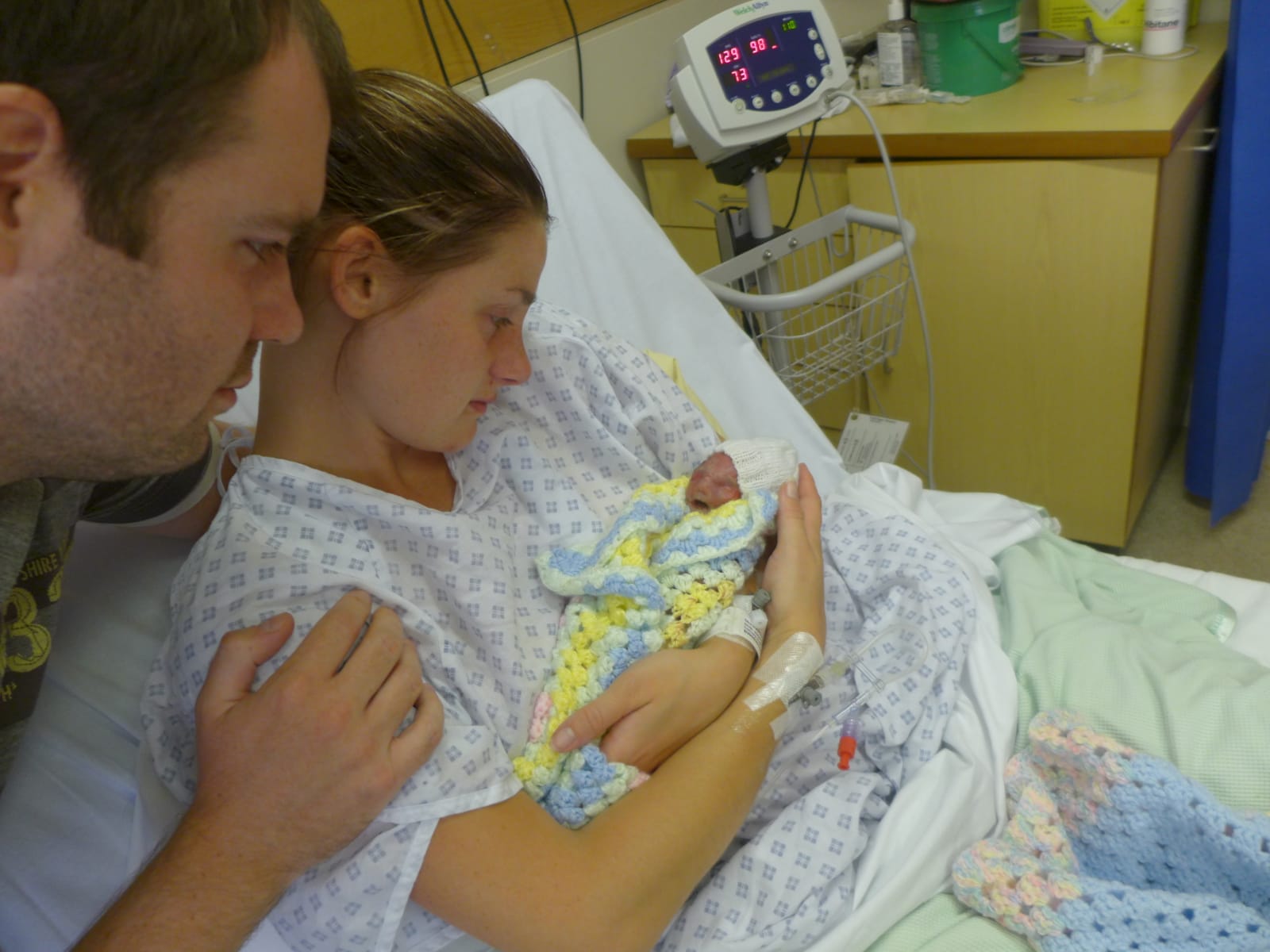‘Walking into that cemetery holding that tiny coffin’: Women recount the trauma of stillbirth
‘One of the most heartbreaking things was holding James who was not alive and hearing all the other babies around us being born and crying. It was like a cruel joke,’ one woman tells Maya Oppenheim


Every single day, about 14 babies die before, during or soon after birth in the UK – yet campaigners warn the issue is routinely ignored by society and remains a taboo.
The Independent spoke to women whose lives have been irrevocably changed after losing their baby through a miscarriage, stillbirth or neonatal death to mark Baby Loss Awareness Week.
‘I haemorrhaged and I nearly died because of blood loss’
Marie Edwards, who lives in Herefordshire, gave birth to a baby girl called Emeleia, who weighed just a pound. The 39-year-old, who suffers from a rare condition that means she has two uteruses, went into labour at 23 weeks.
“She was too tiny and delicate to hold when she was born and there were too many wires in her. Shortly after Emeleia was rushed off to an incubator in an intensive care unit, I haemorrhaged and I nearly died because of blood loss.
“As parents, we couldn’t begin to think she was going to pass away. The only time I really got to hold her was when she was 13 days old and I said goodbye. The doctors gently removed the tubes and then she stopped breathing. She managed about 10 minutes on her own without the tubes and life support. After she passed away we washed her for the first time and wrapped her up in a pink blanket.”
‘In my subsequent two pregnancies, I planned both my babies’ funerals’
Lynette Parks, who lives in Hadley, went to hospital after finding a small amount of discharge when she was seven months pregnant.
The 32-year-old, whose pregnancy had been straightforward, was told they could not find her baby’s heartbeat by doctors when she arrived.
She said: “It was like our world stopped. We broke down in tears. When I walked in at 10pm with a hospital bag at night to have the stillbirth, I looked heavily pregnant. Someone said, ‘Congratulations and good luck.’
“I looked like any other pregnant woman going in to give birth. They didn’t know I was going in to give birth to a dead child.
“One of the most heartbreaking things was holding James who was not alive and hearing all the other babies around us being born and crying.
“It was like a cruel joke. I’ve been diagnosed with post-traumatic stress disorder, which five years on is still an issue. I couldn’t have scans alone because it brought back so many traumatic memories and emotions.
“In my subsequent two pregnancies, I planned both my babies’ funerals. You never ever imagine you are going to plan your babies funeral and nothing can prepare you for that. For walking into that cemetery holding that tiny coffin knowing that is the last time you are going to hold that child.”
Ms Parks, who is an occupational therapist, said James’ pushchair arrived in the post the day after she had given birth to him – adding that it was a distressing "reminder of what we didn’t have”.
“I was very easy going before. Whereas now I always see the worst potential,” she added. “I catastrophise a lot.”
‘It has such a massive effect on every aspect of your life: mental health, confidence and anxiety’
Amy Jackson, who lives in the West Midlands, lost her child Lily Mae to a stillbirth at 37 weeks after having a totally normal pregnancy.
The 39-year-old, who has since set up the Lily Mae Foundation to help bereaved parents going through baby loss, said her daughter’s growth started to tail off in the last couple of weeks but doctors decided there was nothing wrong with her.
Ms Jackson added: “We went back to normal maternity care. Then one day, I hadn’t felt many movements so we contacted the local hospital. They couldn’t find her heartbeat. Ryan [her husband] was very angry with what had happened. He punched a wall.
“I went into phoning people to tell them. I went into autopilot. We had to go home Friday evening and we were told to come back on the Sunday morning. They gave me tablets to start softening my cervix so they could induce me.”
Ms Jackson, who lost Lily Mae 10 years ago, said that weekend was the most difficult of their lives. They went shopping to buy Lily Mae two outfits, one to put her in when she was born for them to keep, and another for her to be buried in.
“The labour was horrendous – going through all this agony and pain knowing when you have this baby, you have to say goodbye to them straight away,” Ms Jackson adds. “It was life-changing. It has such a massive effect on every aspect of your life: mental health, confidence and anxiety. You think your baby is going to change your life and then suddenly you have that path ripped out from under your feet and thrown onto this horrendous path of baby loss."
Ms Jackson, who has four other children, said she had never heard of a stillbirth until having one herself. She said the experience has created tension in her relationship with her husband due to them processing the grief in entirely different ways.
‘I collapsed to my knees. I felt such a failure. It was awful’
Sally Jacks, a BBC TV presenter who lives in Burnley, has had two miscarriages which have profoundly impacted her mental health.
The 43-year-old, who has been with her husband since she was 17, said she was ecstatic when they found out she was pregnant but this dramatically changed after she started to spot at ten or eleven weeks back in 2016.
Ms Jacks said: “I had awful stomach cramp. I was bleeding. I had big clots. I was screaming on the phone to my husband at 3am. I cry a lot when I talk about this. I got up in pain and I rang the local hospital to where I was working and they said: ‘Take a couple of paracetamols and ride it out’.
“But another hospital near me was fantastic and said you need home to go to a hospital. They said there is a possibility you could haemorrhage and lose a lot of blood. I was not thinking straight. I’m so hell-bent on work, I actually went on air on television that day. I remember the room was spinning and I didn’t know what I was doing.
“I then travelled four hours straight to the hospital near me in Burnley. It was all gone. There was nothing there. I remember I was wearing a white t-shirt, blue jeans, and gold sparkly converse and there was a handrail. I collapsed to my knees. I felt such a failure. It was awful.”
Ms Jacks, who went on to bleed for ten days, said she got an infection after the miscarriage and wound up collapsing on air while presenting.
The TV presenter, who has a six-year-old son, suffered a second miscarriage where she lost the baby after six or seven weeks back in 2018.
“The biggest thing for me is I feel a failure,” she adds. “I feel like I’ve failed my family and my husband because I couldn’t produce. It is absolutely horrific. Before my thoughts were: ‘You haven’t had the baby, you’ve never met it, what’s the problem’. That was me in a younger state. But it’s one of the worst things in life. Not just the physical pain but the fact that everytime you go to the toilet you are reminded for the next 10 to 14 days because you are bleeding.”
‘His nursery was completely full and ready. We had clothes, a cot, a rocking chair’
Lauren Naraine, who lives just outside of Birmingham, went into labour on New Year’s Eve with her son Zachery when she was almost 39 weeks pregnant.
The 31-year-old, who works in recruitment, said something felt strange and she could not feel him inside her and doctors could not find a heartbeat when she arrived in hospital.
She said: “I screamed when I was told he had passed away. The shock of finding out meant that my labour stopped. My entire life changed in a moment. They had to give me a tablet to release my placenta so that I would then go back into labour. I went back home and then back to hospital to give birth to him 19 hours after I had found out he had died.
“I switched off emotionally. I felt very numb. I had an epidural because I didn’t want to feel it. You can never not wonder ‘what if?’ You can never not picture them at what age they would be.
“His nursery was completely full and ready. We had clothes, a cot, a rocking chair. The lot. It was ready for him. We had a blanket made out of his clothes for my daughter Isla. When we’re at family events, it is so obvious he is the only one missing.”
Ms Naraine said the experience ruined her next pregnancy with Isla as she was riddled with “horrendous” anxiety – adding that it was “impossible” to enjoy.
“I kept worrying she would die,” she added. “Waiting for it to happen. It has put me off having anymore kids. I couldn’t do the pregnancy again. Mentally, it was draining. I don’t think my husband could do it again.”
Join our commenting forum
Join thought-provoking conversations, follow other Independent readers and see their replies
Comments




Bookmark popover
Removed from bookmarks